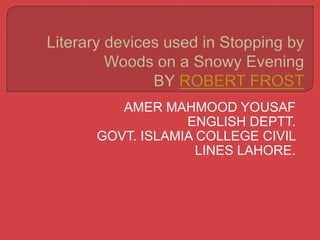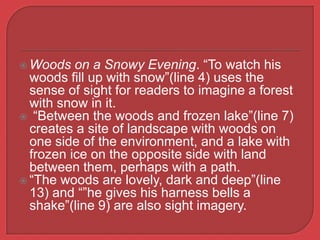literary devices used in Stopping by woods on a snowy evening
- 1. AMER MAHMOOD YOUSAF ENGLISH DEPTT. GOVT. ISLAMIA COLLEGE CIVIL LINES LAHORE.
- 2. ď‚ž Whose woods these are I think I know. ď‚ž His house is in the village though; ď‚ž He will not see me stopping here ď‚ž To watch his woods fill up with snow. ď‚ž My little horse must think it queer ď‚ž To stop without a farmhouse near ď‚ž Between the woods and frozen lake ď‚ž The darkest evening of the year.
- 3.  He gives his harness bells a shake  To ask if there is some mistake.  The only other sound’s the sweep  Of easy wind and downy flake.  The woods are lovely, dark and deep.  But I have promises to keep,  And miles to go before I sleep,  And miles to go before I sleep.
- 4. ď‚ž Robert Frost writes the poem of Stopping By Woods on a Snowy Evening in first person point of view. ď‚ž in iambic pentameter. ď‚ž four quatrains. ď‚ž aaba, bbcb, ccdc, dddd
- 5.  Stopping By Woods on a Snowy Evening can be symbolic for many things, but in this case, it probably means reminiscing past memories when a person is in the older years on their life.  In the first stanza, Frost’s narrator states that he is passing some woods of a man who lives in the village, watching them to “fill up with snow”(line 4).
- 6. ď‚ž Woods are symbolic for life, and while the snow indicates winter, this could mean the narrator is elderly. If that symbolism is added to that stanza, the first stanza quite possibly mean that the narrator is an aged man, looking at his life, remembering all in which has happened in it.
- 7.  On to the second stanza, the narrator mentions that he is “between the woods and frozen lake, the darkest evening of year”(lines seven and 8).  Symbolically this represents that he is at the beginning of the end of life.
- 8.  However, in line five, the narrator barely elucidates that he is riding a horse, and stops it “without a farmhouse near”(line 6) which corresponds to the third stanza. “My little horse”(line 5) in the third stanza is given human characteristics, because the horse asks if stopping between the woods and frozen lake is some mistake, and the horse is then even more confused for the only other sound is of the wind and snow falling.
- 9.  Lines 13, 14, 15, and 16 in the fourth and last stanza of Stopping By Woods on a Snowy Evening says that although the “woods are lovely, dark and deep”(line 13) the narrator has “promises to keep”(line 14) and “miles to go before I sleep”(lines 15 and 16).
- 10. ď‚ž Translated into symbolism, this means that although life is mysterious and wonderful, he has obligations to keep, and much to do before his breaths his last breath and dies.
- 11.  The examples of the rhymes in Frost’s poem are from the lines of one and four, lines five, six and eight, and lines 15 and 16. “Know” and “snow”(lines 1 and 4), “queer,” “near” and “year”(lines 5, 6, and 8) and “sleep” and “sleep”(line 15 and16) are examples of masculine rhyme because one syllable rhymes in the word.
- 12.  True rhyme occurs during the lines of 13 and 14 with the words “deep” and “keep.” These words are true rhyme because only the first syllable does not rhyme.  There is one example of internal rhyme is “he” and “me”(line 3).
- 13. on a Snowy Evening. “To watch his woods fill up with snow”(line 4) uses the sense of sight for readers to imagine a forest with snow in it.  “Between the woods and frozen lake”(line 7) creates a site of landscape with woods on one side of the environment, and a lake with frozen ice on the opposite side with land between them, perhaps with a path.  “The woods are lovely, dark and deep”(line 13) and “”he gives his harness bells a shake”(line 9) are also sight imagery.  Woods
- 14.  “He gives his harness bells a shake” also incorporates sound. The line “The woods are…” gets readers to envision a setting of the woods that is beautiful, with little spaces between the trees to give it a dark feeling that seem to never end.
- 15. Symbolically, the horse the narrator implicates can symbolize something that guides him through life.  In lines five and six the narrator voices “My little horse must think it queer, To stop without a farmhouse near”(lines 5 and 6).  If the horse is symbolic for something that is guiding him through life, such as a person whom he loves, this could mean that such person thinks it odd for him to “stop without a farmhouse near.”  If this is to be so, then later in Frost’s poem, then when the narrator says “He gives his harness bells a shake, To ask if there is some mistake”(lines 9 and 10) 
- 16. this could mean that the person is trying to get the narrator’s attention to ask him questions about his life, or the end of it, because the next lines “The only other sound’s the sweep, Of easy wind and downy flake”(lines 11 and 12) can mean the narrator might not have a an answer to the persons question.  The reasoning for this is that if the narrator asks these questions and the only other sounds is of “easy wind” and “downy flake” then that means that out of the sounds that is supposed to be there, there is only the questions and not of a response. 
- 17.  Another literary element in the poem Stopping By Woods on a Snowy Evening is personification. The first example happens in line five “My little horse must think it queer.”  The next example of personification is in the third line of the third stanza, for it reads, “To ask if there is some mistake.”
- 18.  Robert Frost’s poem Stopping By Woods on a Snowy Evening has an example of connotative and denotative word meanings. Fourth stanza, third and fourth lines, the word sleep is an example. Denotatively, sleep means to take the rest afforded by a suspension of voluntary bodily functions and the natural suspension, complete or partial, of consciousness or to cease being awake. How Frost means sleep though is the connotative meaning though. Frost means for sleep to be death. This changes the meaning of the lines completely.
- 19. ď‚ž Robert Frost writes the poem Stopping By Woods on a Snowy Evening in 1st person point of view has symbolic meanings hidden in it.



















